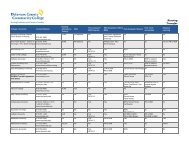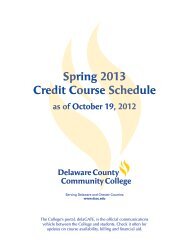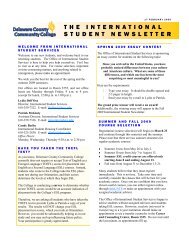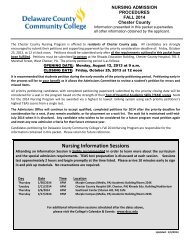2010 Catalog - Delaware County Community College
2010 Catalog - Delaware County Community College
2010 Catalog - Delaware County Community College
You also want an ePaper? Increase the reach of your titles
YUMPU automatically turns print PDFs into web optimized ePapers that Google loves.
96 COURSE DESCRIPTIONS<br />
• Develop an understanding of market research in a<br />
volatile industry.<br />
• Establish the basics of customer satisfaction from an<br />
economic value perspective. Demonstrate<br />
comprehension of the role of the marketing manager in<br />
a sporting environment.<br />
• Describe Sponsorship as a Sports Product.<br />
Prereq. BUS 212<br />
3 Credits 3 Weekly Lecture Hours<br />
BUS 243<br />
Legal Environment of<br />
Business<br />
This course examines the contemporary legal environment<br />
as it relates to business. Among the topics covered are the<br />
origins of law and the legal system; ethics and social<br />
responsibility of business; contracts and non-contractual<br />
injury; agency relationships; governmental regulations<br />
of trusts, securities, employment and the environment;<br />
the Uniform Commercial Code; and international law<br />
affecting business.<br />
Upon successful completion of this course, students<br />
should be able to:<br />
• Describe how our law is derived from common and<br />
statutory law, constitutional interpretation and<br />
administrative regulations.<br />
• Identify the federal and state court systems, jurisdiction<br />
and functions.<br />
• Discuss the ethical and social responsibility of business.<br />
• Discuss contracts including the formulation, dissolution<br />
and remedies for breach.<br />
• Examine non-contractual injury, including negligence,<br />
strict liability, intentional torts and business-related torts.<br />
• Describe the agency relationship and other business<br />
organizations, such as partnerships and corporations.<br />
• Discuss the government regulations of business as they<br />
pertain to anti-trust, securities, employment and<br />
the environment.<br />
• Examine the Uniform Commercial Code with special<br />
emphasis on sales, personal property, commercial paper<br />
and secured transactions.<br />
• Identify current legislation and trends in international law.<br />
Prereq. ENG 100<br />
3 Credits 3 Weekly Lecture Hours<br />
BUS 246<br />
Teamwork<br />
This course addresses the use of teamwork in a business<br />
environment both to identify and to solve problems. The<br />
course will emphasize examples, role playing and exercises<br />
for group participation.<br />
Upon successful completion of this course, students<br />
should be able to:<br />
• Analyze group dynamics and group process, and suggest<br />
interventions to improve them.<br />
• Explain how problem solving differs in a group setting.<br />
• Practice the interpersonal skills needed for<br />
effective teamwork.<br />
• Demonstrate conflict-management skills.<br />
• Perform the roles of leader, facilitator and participant<br />
on teams.<br />
• Identify the key aspects of effective meetings.<br />
• Demonstrate effective meeting skills.<br />
• List and compare the stages of team development.<br />
• Contrast the different roles played by members of teams<br />
and meeting participants.<br />
• Describe personal impact in teams and personal<br />
reactions to team interactions.<br />
• Discuss the management of diversity on teams.<br />
• Describe various applications of teamwork within<br />
unit-based, cross-functional, customer and<br />
vendor organizations.<br />
Prereq. ENG 050 and REA 050 or pass test<br />
3 Credits 3 Weekly Lecture Hours<br />
CHE 100<br />
(CHE) Chemistry<br />
Chemical Science and the<br />
Environment<br />
This course begins with a survey of some of the principles<br />
of chemistry. These principles are then applied to practical<br />
topics such as air and water pollution, global warming,<br />
resource and energy options. This course is intended for<br />
non-science majors interested in chemistry and how it<br />
relates to the environment.<br />
Upon successful completion of this course, students<br />
should be able to:<br />
• Demonstrate a number of non-mathematical chemical<br />
principles such as simplified atomic structure, chemical<br />
bonding and naming of compounds<br />
• Describe the major types, causes, and possible solutions<br />
of air and water pollution<br />
• Discuss the future problems and solutions of the world's<br />
energy problems<br />
• Relate the basic chemical principles to other<br />
environmental and personal chemistry related issues<br />
Prereq. REA 050, ENG 050, MAT 060<br />
4 Credits 3 Weekly Lecture Hours<br />
2 Weekly Laboratory Hours<br />
CHE 105<br />
Technical Chemistry<br />
This course is intended primarily for students who are in<br />
the various technology programs. It is designed to provide<br />
an understanding of basic chemical principles that will<br />
allow the students to take their places as scientifically<br />
literate members of society and to work in their various<br />
occupations (such as plant operators in the petrochemical,<br />
food, or pharmaceutical industries, as well as public safety<br />
officers who must respond to incidents involving toxic and<br />
hazardous materials). The course will not involve detailed<br />
chemical calculations or advanced theoretical topics.<br />
Upon successful completion of this course, students<br />
should be able to:<br />
• Explain how the elements are used to form compounds<br />
• Discuss the fields of Organic & Inorganic Chemistry<br />
• Describe the chemistry of fire and explain the process of<br />
extinguishment<br />
• Describe the petroleum industry and explain the<br />
petroleum refining process<br />
• Discuss the causes of air and water pollution and explain<br />
their consequences<br />
• Select the means to assess the safety of chemicals and<br />
describe the value of MSDS, the Merck Index, and<br />
other references<br />
Prereq. MAT 060<br />
3 Credits 2 Weekly Lecture Hours<br />
2 Weekly Laboratory Hours<br />
CHE 106<br />
Introduction to Chemistry<br />
Credits for this course will count as a science elective<br />
at DCCC for all curricula except the natural science<br />
curriculum. This course may not be transferable for<br />
science majors. This course is designed for but not limited<br />
to students who wish to take General Chemistry but have<br />
inadequate backgrounds.<br />
Upon successful completion of this course, students<br />
should be able to:<br />
• Use scientific notation to multiply and divide.<br />
• Use an electronic calculator to multiply and divide.<br />
• Measure the length, mass, volume and temperature of<br />
materials using the metric system.<br />
• Recall common conversion factors in the metric system.<br />
• Use dimensional analysis.<br />
• Use significant figures.<br />
• Draw graphs according to established criteria.<br />
• Demonstrate laboratory skills by naming laboratory<br />
equipment and distinguishing among types of substances.<br />
• Recall a simplified theory of atomic structure.<br />
• Describe ionic and covalent bonds.<br />
• Demonstrate an understanding of the mole concept.<br />
• Calculate basic stoichiometric relationships.<br />
• Complete calculations based on the gas laws.<br />
Prereq. MAT 060<br />
3 Credits 2 Weekly Lecture Hours<br />
2 Weekly Laboratory Hours<br />
CHE 110<br />
General Chemistry I<br />
This course is designed for students majoring in science<br />
or engineering fields.<br />
Upon successful completion of this course, students<br />
should be able to:<br />
• Use the metric system as a tool for performing<br />
measurements of length, area, mass, volume, energy and<br />
amounts of substances in terms of moles.<br />
• Identify and classify substances with regard to type,<br />
state, purity and modes of change.<br />
• Usefully apply the knowledge of the periodicity of the<br />
elements toward the description of chemical bonding.<br />
• Solve mathematical problems related to chemical change<br />
and the mole concept.<br />
• Explain and illustrate, by example, a variety of conceptual<br />
models used in studying the structure and behavior of<br />
atoms, molecules, solids, liquids and gases.<br />
• Demonstrate approved techniques in gravimetric and<br />
volumetric methods in the laboratory.<br />
Prereq. MAT 100 or CHE 106<br />
4 Credits 3 Weekly Lecture Hours<br />
3 Weekly Laboratory Hours<br />
CHE 111<br />
General Chemistry II<br />
This course is a continuation of General Chemistry I.<br />
Upon satisfactory completion of this course, students<br />
should be able to:<br />
• Prepare solutions with specific concentration values.<br />
• Understand and apply the colligative properties of<br />
solutions toward the solution of practical problems.<br />
• Evaluate and apply modern theories of acids and bases,<br />
especially the concept of pH.<br />
• Apply the principles of kinetics and equilibrium toward<br />
the productive handling of systems of weak electrolytes.<br />
• Understand and use the principles of oxidation reduction,<br />
electrochemistry and thermodynamics in explaining why<br />
chemical reactions occur and what benefits or<br />
consequences may result.<br />
• Apply the principles of nuclear chemistry to the solution<br />
of problems relevant to contemporary society.<br />
Prereq. CHE 110<br />
4 Credits 3 Weekly Lecture Hours<br />
3 Weekly Laboratory Hours<br />
CHE 200<br />
Organic Chemistry I<br />
An integrated study of carbon compounds with emphasis<br />
on structure, stereochemistry, reactions and synthesis.<br />
Laboratory work will emphasize record keeping, separation,<br />
purification and identification using chromatography.<br />
Upon successful completion of this course, students<br />
should be able to:<br />
• Describe the chemical bonding in organic compounds.<br />
• Analyze the thermodynamic and kinetic relationship in<br />
organic reactions.<br />
• Describe the physical properties, stereochemistry,<br />
preparation, reactions and multistep synthesis<br />
of hydrocarbons.<br />
• Demonstrate laboratory procedures for record keeping,<br />
separation, purification and identification using<br />
chromatography.<br />
Prereq. CHE 111<br />
5 Credits 4 Weekly Lecture Hours<br />
3 Weekly Laboratory Hours<br />
DELAWARE COUNTY COMMUNITY COLLEGE

















